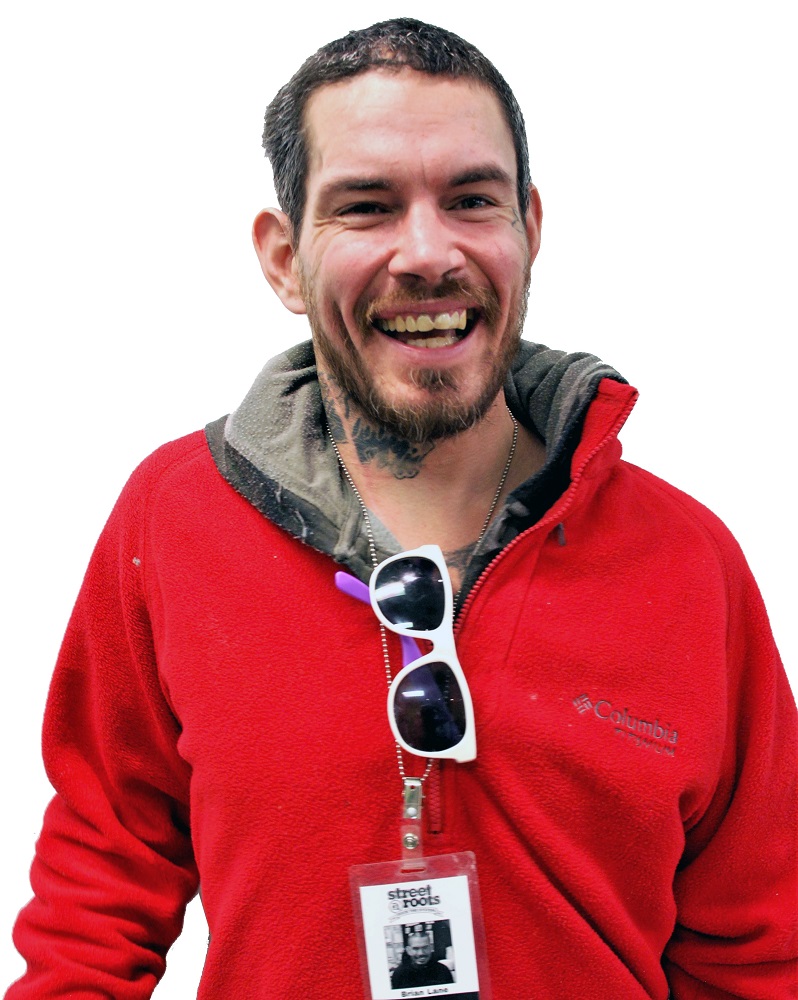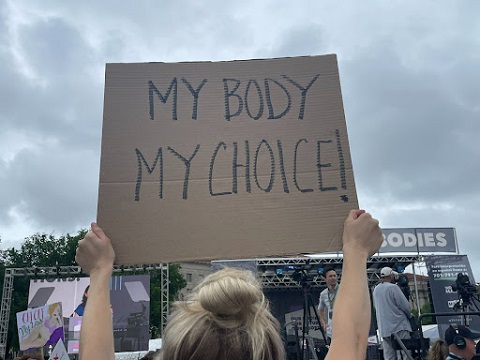By Leonora Ko, Street Roots
Brian Lane is a beloved son and a proud member of the Lummi Tribe, which is based near Bellingham, Washington. He credits both as being reasons why he survived a recent traumatic injury.
Brian moved in order to get away from a Bellingham crowd that was into drugs and he went to Seattle to get clean. He was injured five days later.
“I still can’t figure out how I lived through it. I got sprayed right in the neck with a pressure washer,” he tells me. “I lost so much blood that I suffered a stroke.”
A cousin suggested that Brian survived because of the warriors in their family lineage.
“We have strong medicine,” Brian says. “I call it our spirit. It’s because of the strength I have inside of me. And I personally believe God puts that strength there.”
Back in Bellingham, his mother watched over him while he healed.

“She’s the world,” Brian says.
But he found himself back in the old crowd that triggered his addictions, so around last October, Brian moved again; this time to Portland.
“I moved down here from Washington to get away from the drugs. Trying to stay sober and all that stuff, you know?” he explains. “I’m getting better, but you should have seen me three years ago.”
Still, life is far from easy. Brian lives on the street with a disability. He suffers from paralysis on his left side and he has a brain injury that causes his memories to come and go.
“It’s like you take a chalkboard and you wipe off the chalk real quick,” he explains. “I don’t know why everything is so difficult. I just know that it is.”
It starts first thing in the morning when he struggles to tie his shoes or stabs himself in the finger adjusting a safety pin on his belt.
“It all just sounds stupid when you talk about it, man,” he sighs. “Those things are like little things, but they’re on top of a hundred other things throughout the day.”
Brian has spent over 15 years in prison and was used to being tough.
“There’s a lot of egoism in the penitentiary,” he says.
“I’m caught in this big spiral where I don’t want to ask you for help because I feel weak if I ask you for help,” Brian explains, “but it’s like, at the same time, the rational and responsible side says, ‘You are a frickin’ stroke victim. You do need some kind of assistance.’
“There have been times when I really wanted to kill myself,” he admits. “[Then] some random person will come into my life. Sometimes it’s money. Sometimes it’s conversation. But at pivotal moments, this spiritual force keeps showing up.
“[It says] ‘Don’t give up, man. You’re still trying to figure it out. And when you do, you’re going to understand it and it’ll be a lot better.’ Whether or not it’s going to work is yet to be seen, but it keeps me going.”
Brian is a firm believer in Street Roots. He remembers a customer who told him, “I already have a copy, but I approve of what you guys are doing” and tipped him anyway.
“It’s an opportunity to advance and improve your situation. It really is, man,” Brian says. “I can’t really wrap my head around how noble it is.”
“Don’t give up, man. You’re still trying to figure it out. And when you do, you’re going to understand it and it’ll be a lot better.”
But for him, the care that Brian has found at Street Roots has meant more. In the past, he had daily blowups in the Street Roots office.
“Someone bumps into you, and that sets off a big ol’ temper tantrum,” he reflects. “But now I’m understanding all that. I’m trying to be more mindful.”
Brian has also noted another change: “Yeah, it might be cold, it might be raining, but everyone sees me selling the paper up here, and I’m attracting a different kind of crowd: the people that work, the people that know about Street Roots.”
Brian takes full responsibility for his behavior and addiction.
“I’m not trying to get sympathy,” he explains. “I just want to let you know, I understand, I’m on top of it … so let’s move forward.”
Brian has quit cigarettes and is working on recovery. He is connected to a social worker and a doctor and is on a housing list.
“All this stuff is growth for me,” says Brian. He hopes that someday he’ll have stability.




















